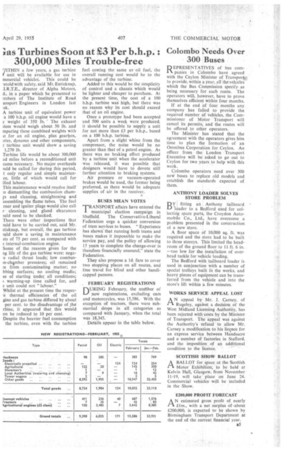ias Turbines Soon at £3 Per b.h.p. :
Page 39

If you've noticed an error in this article please click here to report it so we can fix it.
300,000 Miles Trouble-free
IITHIN a few years, a gas turbine unit will be available for use in mmereial vehicles. This could be -etold with safety, said Mr. EnticknaP, .I.R.T.E., director of Alpha Motors, d., in a paper which he presented to :mbers of The Institute of Road ansport Engineers in London last ek.
A turbine unit of equivalent power a 100 b.h.p. oil engine would have a y weight of 350 lb. ' The exhaust item would weigh about 50 lb. and mparing these combined weights with it for an oil engine, plus gem-tic:ix, ,rter, dynamo and other components, : turbine unit would show a saving 1,270 lb.
Turbine life would be about 300,000 ad miles before a reconditioned unit came necessary. No major overhauls mid be called for during this period, t only regular and simple maintencm, little of which would call for illed labour.
This maintenance would resolve itself m dismantling the combustion chamrs and cleaning, straightening end issembling the flame tubes. The fuel rner and igniter plugs would also call r cleaning, and gland clearances )uld need to be checked.
There were other inspections that mid have to be carried out, said Mr. rticknap, but overall, the gas turbine mid show a saving in maintenance sts of 75 per cent. as compared with :. internal-combustion engine.
Some of the reasons given for the rig life of the gas turbine were: negare radial thrust loads; low combusin-chrber pressures; oil remained m from contaminating matter; no bbing surfaces; no cooling media; se of starting under all conditions; warming-up time called for, and e unit could not "labour."
Whilst at the present time the respecre thermal efficiencies of the oil gine and gas turbine differed by about per cent. to the disadvantage of the rbine, it appeared that this would on be reduced to 10 per cent.
Despite the heavier fuel consumption the turbine, even with the turbine fuel costing the same as oil fuel, the overall running cost would be to the advantage of the turbine.
Added to this would be the simplicity of control and a chassis which would be lighter and cheaper to purchase. At the present time, the cost of a 100 b.h.p. turbine was high, but there was no reason why its cost should exceed that of an oil engine.
Once a prototype had been accepted and 500 units a week were produced, it should be possible to supply a unit for not more than £3 per b.h.p., based on a 100 b.h.p. turbine.
Apart from a slight whine from the compressor, the noise would be no greater than that of a petrol engine. As there was no braking effect produced by a turbine unit when the accelerator was released, it was possible that designers would have to devote still further attention to braking systems.
Air pressure or vacuum-operated brakes would be used, the former being preferred, as there would be adequate supplies of air in the receiver.
BUSES MEAN VOTES TRANSPORT affairs have entered the 1 municipal election campaign in Sheffield. The Conservative-Liberal Federation urge a quicker conversion of tram services to buses. "Experience has shown that running both trams and buses makes it impossible to make the service pay, and the policy of allowing 15 years to complete the change-over is therefore financially unsound," state the Federation.
They also propose a Id. fare to cover two stopping places on all routes, and free travel for blind and other handicapped persons.
FEBRUARY REGISTRATIONS
DURING February, the number of new registrations, excluding cars and motorcycles, was 15,586. With the exception of tractors, there were substantial drops in all categories as compared with January, when the total was 18,345.
Details appear in the table below.




































































































